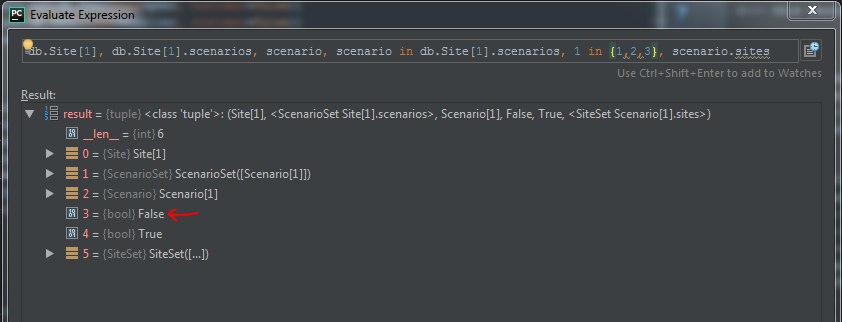@luckydonald So it will be similar to the new where method.
Yes, sort_by (the previous/current order_by behavior) is similar to filter: it works with query result, like filter or map methods in Python.
The future order_by will be similar to where: if query looks like
select(x.y for x in X)
The order_by lambda will receive x, not x.y
 Alexander
Alexander
In most queries, the generator output the same objects which are iterates over:
select(x for x in X if <some condition>)
For such queries, there is no difference between current and future order_by behavior, they continue working as before
 Lucky
Lucky
@luckydonald So it will be similar to the new where method.
My usecase is to order by a column, like
select(s for s in Sticker)
.order_by(orm.desc(Sticker.date_added))
How does that translate to the new one?
 Alexander
Alexander
In that query, you iterates over s and then output s too. For such query, nothing is changed, you can continue use order_by
 Henri
Henri
I use
result = Article.select()
result = result.sort_by(desc(Article.created_at))This has no lambda, but I think it has to change to sort_by.
 Henri
Henri
So something like the following should not work anymore (from the docs):
q = select(o.customer for o in Order)
q2 = q.order_by(Customer.name)
 Alexander
Alexander
Henti, you are right
@luckydonald The change is not about lambdas, it is about object we use to ordering. If query looks like
select(x.y for x in X)
We have two different objects: x and x.y. In release 0.8 order_by will work with x while right now it works with x.y
select(x.y for x in X).order_by(Y.a) # now
select(x.y for x in X).sort_by(Y.a) # now
select(x.y for x in X).order_by(X.b) # starting from 0.8
 Matthew
Matthew
I think I have found a regression in 0.7.3 - TypeError: Attribute RisingProductRecord.current_result has unknown option 'size'
 Alexander
Alexander
I looks a bit strange when you set size option for relationship attribute. I think such attribute should automatically take all options from the primary key of the related entity. What is the purpose to set different size than in the related primary key?
 Matthew
Matthew
I believe it was required in a previous version of Pony, but I removed it and 0.7.2 runs without it
 Matthew
Matthew
I looked through the docs and can't see a reference to size attribute for foreign key relationships, so it looks like my mistake
 Matthew
Matthew
I have a git commit from November 2016 where the only change was to add the size=64 attribute, so it seems likely that it was required then
 Matthew
Matthew
I think that's likely. Can you think what changed in 0.7.3 which means it no longer accents the size attribute?
 Alexander
Alexander
Maybe it was some refactoring, I'll look and tell you. I don't remember we were doing something specifycally related to this
 Alexander
Alexander
It was the following fix: https://github.com/ponyorm/pony/commit/de7e7e1317e1cc934b3b6f8c36b18ad7386a2e8d
Earlier unknown options for relationship attributes just were ignored silently
 Matthew
Matthew
On < 0.7.3, Pony is doing LIMIT 2 when attributes are passed to .get() when there is a composite key for those attribtues. With 0.7.3 and a composite key, now it seems like there is no LIMIT in the query at all for .get()
 Alexander
Alexander
To me it works correctly:
>>> from pony.orm.examples.university1 import *
>>> Student.get(gpa=3.5)
SELECT "id", "name", "dob", "tel", "gpa", "group"
FROM "Student"
WHERE abs("gpa" - ?) / coalesce(nullif(max(abs("gpa"), abs(?)), 0), 1) <= 1e-14
LIMIT 2
>>> Student.get(tel='123-456')
SELECT "id", "name", "dob", "tel", "gpa", "group"
FROM "Student"
WHERE "tel" = ?
LIMIT 2
>>>
 stsouko
stsouko
Hello!
class FiscalNumber(db.Entity):
_table_ = '%s_fiscal' % schema if DEBUG else (schema, 'fiscal')
id = PrimaryKey(int, auto=True)
sign = Required(str)
drive = Required(str)
document = Required(str)
date = Required(datetime)
composite_key(sign, drive, document)
sales = Set('Sale')
for this entity in query
FiscalNumber.exists(sign=fs, drive=fn, document=fd)
sql look like this
SELECT "id", "sign", "drive", "document", "date"
FROM "home_fiscal"
WHERE "sign" = ?
AND "drive" = ?
AND "document" = ?
LIMIT 2
Why used limit 2 for composite key?
 stsouko
stsouko
if someone needs a telegram bot that collects information from receipts (only for russia). https://github.com/stsouko/fns
this bot is open source.
 Alexander
Alexander
Typically we forbid to mix objects from dfferent db sessions, but on this case we forgot to do the check
 Bulat
Bulat
Hi. I have problem with memory. Script takes up 2Gb of RAM after creating 400k Book objects. Is there a way to disable caching for some classes or another solution?
https://gist.github.com/Kurbezz/989a8cc82f56f203b6a61e239dbe6c6e
 Matthew
Matthew
Not your main problem, but you can improve performance by doing author = Author.get(id=a_id)
 Matthew
Matthew
and for your performance issue, how about batching your calls, so maybe doing 1000 "add" invocations per db_session
 Matthew
Matthew
code for chunk() https://stackoverflow.com/questions/312443/how-do-you-split-a-list-into-evenly-sized-chunks
 Alexander
Alexander
Do you have yet another db_session, not displayed in gist code? Only the most outer db_session is taken into account, and inner db_sessions are ignored. The objects are clear out of memory on db_session exit. If you have yet another db_session which wraps all these code, the objects will stay in memory
 Bulat
Bulat
 Alexander
Alexander
Can you enable SQL logging using set_sql_debug(True) in order to see where GET NEW CONNECTION and
RELEASE CONNECTION messages are logged. Is it between each add function call, or just at the beginning and in the end of script execution?
 Alexander
Alexander
In the updated gist code you have the following lines at the end of the script:
temp_db.execute('DROP DATABASE temp;')
temp_db.commit()
 Alexander
Alexander
execute and commit can work inside db_session only. It means that you have some additional db_session which wraps all your script code and holds all the objects
 Alexander
Alexander
Another (hackish) option is to add the following two lines at the end of add function:
commit()
rollback()
commit() is necessary to save your objects to the database. Typically it is performed implicitly on the exit from the db_session
rollback() forces clearing of all objects from the current db_session


